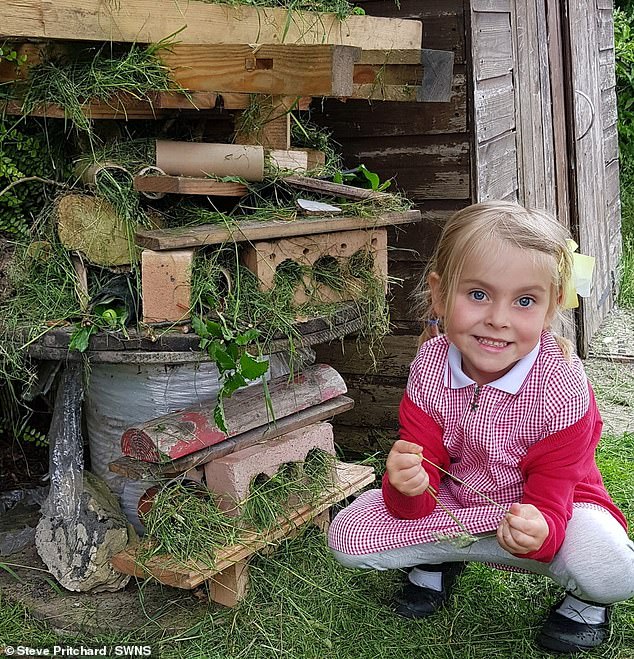‘Normal, healthy’ 11-year-old girl died silently in her sleep, which could happen to one in a thousand Britons
A father has told of his heartbreaking fear after his ‘healthy’ 11-year-old daughter died suddenly in her sleep.
Steve Pritchard, 43, said his daughter Matilda had gone to bed ‘normally’ on the night of April 2 this year and showed no signs of being unwell.
But the next morning Mr Pritchard and his wife, Anna, 43, discovered Matilda had suffered a cardiac arrest in her sleep.
Despite the efforts of paramedics who arrived on the scene within two minutes, she was pronounced dead on arrival at hospital.
Mr Pritchard, a company director from Pudsey, Leeds, said it was later revealed Matilda had an undiagnosed heart condition called arrhythmogenic right ventricular cardiomyopathy.
This is a genetic defect that causes the heart muscle to be weaker than normal and therefore have to work harder to pump blood, resulting in a potentially fatal cardiac arrest.
The gene that causes arrhythmogenic right ventricular cardiomyopathy affects about one in a thousand people, although not everyone who is a carrier will develop the condition.
Both Mr and Mrs Pritchard and Matilda’s older sister Olivia have now undergone various tests to find out if they too have the condition.
Matilda, 11, went to bed normally on an April evening earlier this year but never woke up

Her parents, discovering Matilda unresponsive the next morning, desperately called 999 for help, but despite the efforts of paramedics who rushed to the scene, she could not be resuscitated.

Her father Steve, mother Anna and older sister Olivia later found out that Matilda had an undiagnosed genetic heart condition that caused the organ to fail during her sleep.
“We were immediately concerned about Olivia,” Mr Pritchard said.
‘She is 14 and the symptoms usually start around age 13. But everything came back completely clean – we’re doing well.’
People with arrhythmogenic right ventricular cardiomyopathy may experience symptoms such as palpitations, fainting, shortness of breath, swelling, and chest pain and discomfort.
However, it can sometimes show no symptoms at all, or it may not appear until a person ages, although it can still be fatal even if no signs are present.
The condition is usually diagnosed using scans to examine the size of the heart, as well as tests to measure whether the heart is beating in a normal rhythm.
There is no cure for arrhythmogenic right ventricular cardiomyopathy, also called arrhythmogenic cardiomyopathy, but treatments are available.
These are usually medications that help support the heart, but other options include having a pacemaker installed, implants that monitor the heart and sound the alarm if a problem is detected, or heart surgery.
Such treatments aim to reduce symptoms, allowing people with the condition to lead normal lives and reduce the risk of potentially dangerous complications.

Matilda’s said their daughter was a passionate environmentalist who loved animals and helped clean up litter in her area

As part of honoring her memory, Matilda’s family have set up a fundraising campaign for the charity Keep Britain Tidy
An estimated 64,000 people in Britain are estimated to have a faulty gene that could lead to the condition.
Matilda’s family is now taking steps to fulfill Matilda’s ‘last wish’: ‘to rid the world of litter’.
Mr Pritchard said: ‘It has been catastrophically awful, but I hope we can start the process of our little girl’s dream of a world without litter.’
Matilda, who was ‘an animal lover’ and ‘passionate about the environment’, loved picking up litter in her local park.
In her memory Mr. Pritchard created a online fundraiser for the charity Keep Britain Tidy, with the aim of funding an educational program lasting five years – one for each of Matilda’s secondary school years.
